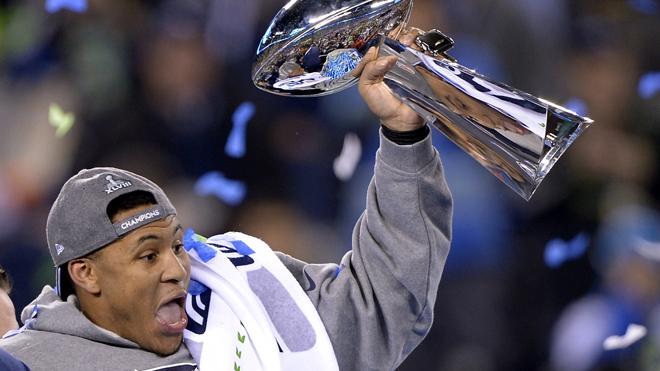Super Bowl Ends In Unexpected Blowout by Seattle
During the anxious anticipation of Super Bowl XLVIII, it was quite common to hear tight, evenly-matched score predictions from NFL analysts and celebrities alike; the final score of this years big game surprisingly could not be found among all of these predictions, as Seattle firmly dominated every facet of this competition in a 43-8 laugher. Seattle has pushed their defense into discussion with the ’85 Bears and the ’00 Ravens with their smothering of the potent Denver offense, as the Seahawks allowed a miniscule 27 rushing yards and caused 4 forced fumbles, wreaking havoc on the discombobulated Broncos offensive line.
The first play of the game sparked Seattle’s field day on quarterback Peyton Manning, as the ball unexpectedly flew over Manning’s head and Knowshon Moreno fell on top of it in the end zone to surrender the safety. Ever since this play, the prolific future Hall-of-Fame quarterback could never find his footing, as he was frequently rushed into short, sometimes negative short passes and never seemed truly comfortable. Amazingly, despite Manning’s pitiful single-digit offensive performance, he set the record for passing completions in a Super Bowl with 34. This feat was accomplished mainly because he never found the opportunity to fire the rock down field for his All Pro receiving corps, therefore forcing him to find quick targets, and also due to the persistently increasing deficit that the Broncos faced throughout the entire game which took away the privilege to run the ball. Peyton’s record-setting regular season rhythm was nowhere to be found on Sunday night, as the offense only salvaged 306 total yards, a full field-length and a half lower than their season average; this number may have even dipped lower if the game were closer down the stretch.
This Super Bowl will go down in history as the most balanced domination of all time, as the Seahawks failed to produce one offensive weapon with more than 70 yards from scrimmage or multiple touchdowns, and all three sides of the ball found the end zone for Seattle (offense, defense, and special teams). This lack of star power was especially evident when relatively unknown linebacker Malcolm Smith earned the honor of Super Bowl MVP for his interception returned-for-a-touchdown at the end of the first half. Some have argued that the entirety of Seattle’s defense warranted the MVP award, and it’s hard to dispute this nomination considering their outstanding team performance.
The utter humiliation of the Denver Broncos secured not only the NFL’s best team, but the NFL’s best conference; it is now obvious that NFC teams were simply playing at a different level than the teams of the AFC. Seattle’s notoriously loud-mouthed defensive back Richard Sherman even stated, once the game was over, that, “The NFC Championship was the Super Bowl”, and that, “The 49ers were the second-best team in the NFL.” As the leader of the “Legion of Boom” (the self-proclaimed pseudonym of Seattle’s secondary), Sherman is justified in his statements, as the 23-17 final score of the NFC Championship would have made for a much more exciting Super Bowl. Instead, America was forcefully reminded of the age-old notion that defense wins championships.


